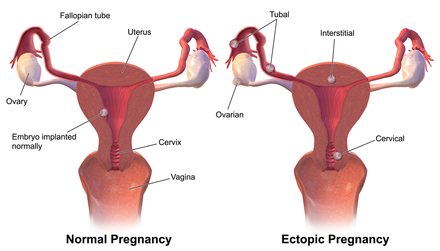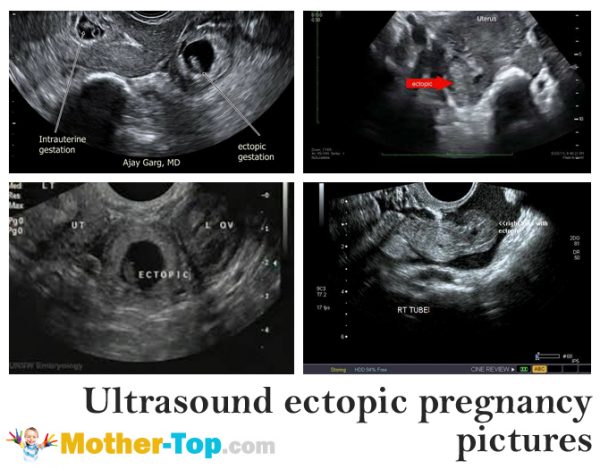Can I determine ectopic pregnancy?
If a woman’s fertilized egg has attached in the ovary, abdominal cavity, fallopian tubes or elsewhere, but not in the uterus where it actually should develop, such a pregnancy is abnormal and is called ectopic. An ectopic pregnancy can never result in healthy childbearing and childbirth.

Every woman of reproductive age must know the ectopic pregnancy symptoms, as it is quite an often condition leading to terrible complications.
This pathology may happen even to healthy women. Let us learn the symptoms of ectopic pregnancy on early terms that any woman can notice herself, and those signs which only a doctor can distinguish according to the results of analyses and complaints of his patient.
An ectopic pregnancy, the signs of which went unnoticed, is rare. More than 65% of the ectopic pregnancy symptoms, such as prolonged bleeding or pain, force a woman to consult a doctor before complications arise. The earlier a woman consults a doctor, the greater chances for successful therapy she has. Therefore, it’s highly important for every woman to know the first obvious signs of ectopic pregnancy.
Ectopic pregnancy symptoms and signs
- Spotting or very light periods.
Quite often, women with ectopic pregnancy have light periods. Therefore, if you periods suddenly become light, you should do a pregnancy test — just to make certain you don’t have an ectopic pregnancy.
- Pain in the lower abdomen.
Abdominal pain is a frequent ectopic pregnancy symptom. Usually, women have painful sensations in one side of their abdomens. They are localized in the side of the affected fallopian tube. However, in cervical pregnancy or when the fetus is in the abdominal cavity, you may feel pain in the middle area of your abdomen.
Abdominal pain in women with ectopic pregnancy is often associated with changes in body position, and aggravates while walking and torso twists.
When do women begin to feel pain in ectopic pregnancy?

This depends on the location of the embryo. If it develops in the ampulla — the widest part of the fallopian tube, the pain begins in the 8th week. If the embryo is in the isthmus — the narrowest part, pain can begin in the 5th week. If it’s an ovarian or abdominal ectopic pregnancy, there won’t be any symptoms for the first four weeks. Cervical pregnancy, in which implantation occurs in the cervix, is very rarely accompanied by pain and may remain unnoticed for a long time.
- Bleeding.
Besides spotting, ectopic pregnancy signs also include heavy and prolonged vaginal bleeding. Most often it is cervical pregnancy that causes prolonged bleeding, because the attachment of the ovum takes place in a very rich in blood vessels area. Sometimes, the blood loss is huge and it is a threat to a woman’s life. In addition, in cervical pregnancy there is a great risk that surgeons will need to remove the uterus to save woman’s life.
Bleeding is also a symptom of a tubal ectopic pregnancy, indicating damage to the wall of the fallopian tube. The best variant is when the fertilized egg spontaneously detaches from the tube without damaging it. It is called tubal abortion and is always accompanied by bloody vaginal discharge.
- A light second strip in pregnancy test
A week second strip is a very often sign of ectopic pregnancy. A normal pregnancy is proceeding with a more significant increase of hormones than an ectopic pregnancy. While pregnancy determination with a pregnancy test women sometimes notice that the second strip is very light. This may indicate a slight increase of hCG hormone. Quantitative determination of the hCG level in blood will help to clarify the situation. Deviations from normal levels allow to suspect an abnormal location of the embryo.
- Dangerous symptoms of ectopic pregnancy
The most critical sign of an ectopic pregnancy is internal bleeding, which it is extremely dangerous to life. It may be indicated by such signs as sharp, intense pain in the lower abdomen, sudden or gradually increasing fatigue, sweating, pale skin, dizziness or even loss of consciousness, and vaginal bloody discharge. This condition requires immediate hospitalization.
What ectopic pregnancy symptoms can doctors distinguish?

- Ultrasound
The most revealing method of determining the embryo position is ultrasound. Doctors use the vaginal sensor to visually confirm the position of the egg in the uterus. It’s sometimes difficult even for doctors to define the location of an embryo when it isn’t where it must be. That’s why just the fact that the fertilized egg is not detected in the uterus when tests for pregnancy are positive can establish the diagnosis of ectopic pregnancy.
- hCG blood test
The hCG blood test can also help to identify pathology. If HCG level is too low, the doctor can suspect frozen or ectopic pregnancy. Note: during the three weeks after conception hCG level doubles every 29−36 hours, then up to 6 weeks it doubles every two days. Doctors analyze the dynamic. If hCG growth is slow, in 80−85% percent it is an ectopic pregnancy sign.




